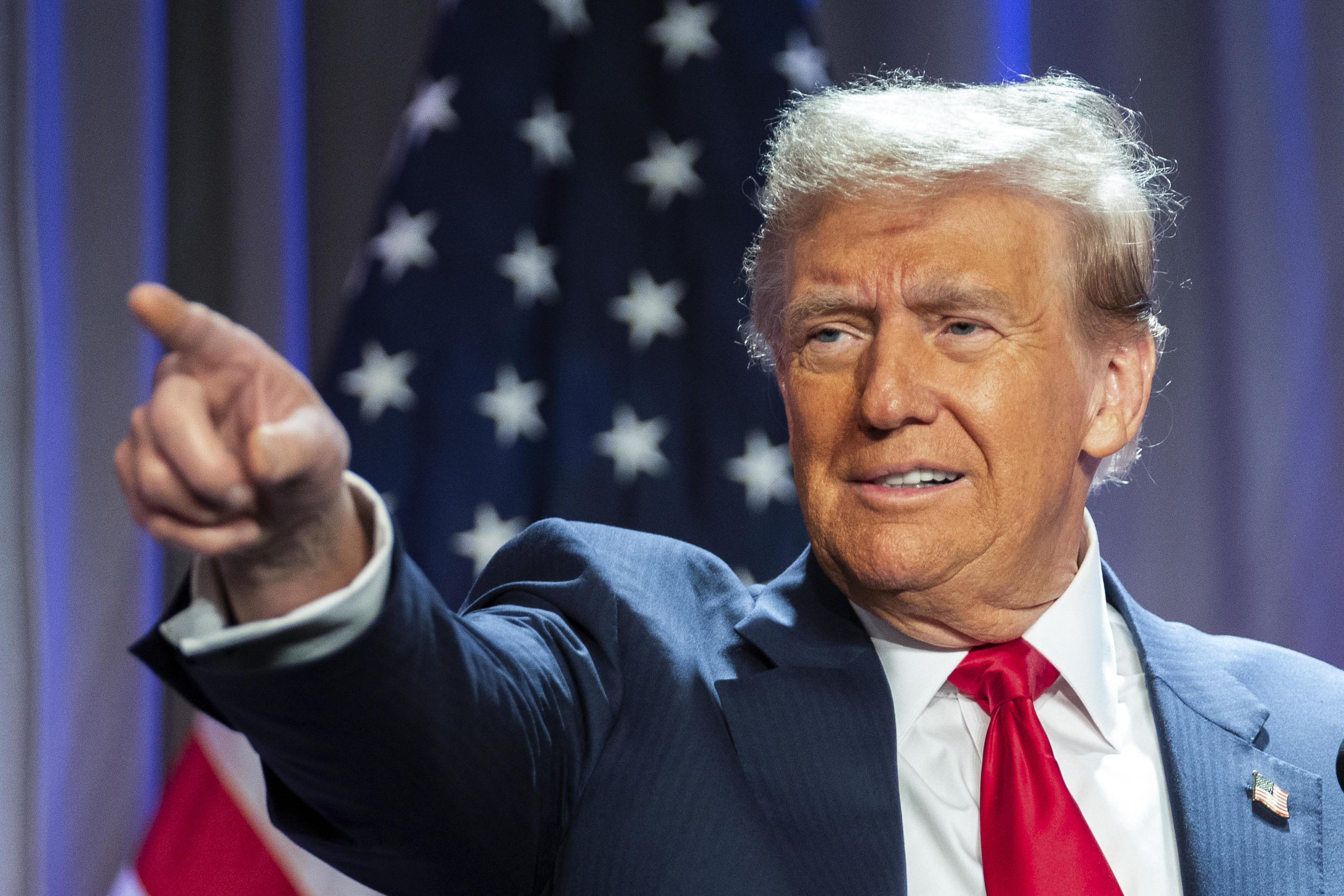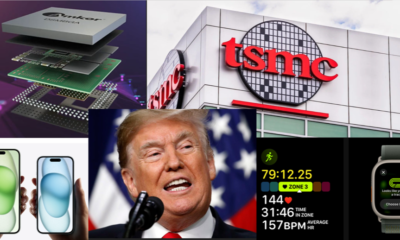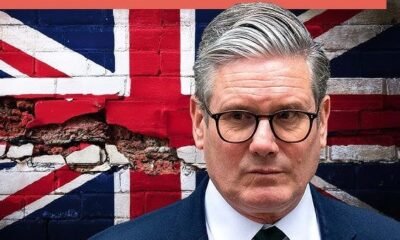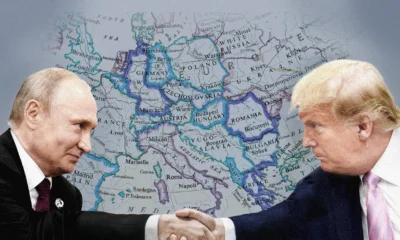Politics
Trump’s Ego Erupts, Declares ‘I Am The President’ To Tame Musk’s Meteoric Rise And ‘Shadow President’ Claims. But Could Musk Be Harbouring Secret Aspirations To Lead America One Day?
Published
1 year agoon

President-elect Donald Trump has finally addressed the growing whispers about Elon Musk’s increasing influence, calling it all a “hoax” and making it clear that he’s not stepping aside for the Tesla mogul. At the Turning Point USA’s AmericaFest conference in Phoenix, Arizona, Trump set the record straight: “No, he’s not taking the presidency,” he declared.
The latest “kick” in the political rumor mill, according to Trump, is the idea that he’s handed over the reins to Musk, something he wasted no time dismissing. “They’re on a new kick… The new one is that President Trump has ceded the presidency to Elon Musk. No, no, that’s not happening,” Trump said, putting that speculation to rest.
As if that wasn’t enough, Trump added a rather curious clarification about Musk’s eligibility, saying the tech billionaire couldn’t even become president because he wasn’t born in the U.S. (As if we needed that reminder, but here’s to a little side conversation about the ongoing debate over birthright citizenship)
Now, whether Musk is secretly the “real president,” the “prime minister,” or simply Trump’s billionaire enforcer, one thing is clear for sure – Musk is carving out a significant role in this administration.
His meteoric rise to prominence in Trump’s inner circle could create some potential conflicts of interest for the future government. While the two have seemingly struck up a powerful alliance—Musk has been a fixture at Mar-a-Lago since Trump’s election.
The tension is palpable, especially as Musk’s recent actions raised eyebrows in Washington. Just last week, Musk played a pivotal role in disrupting a year-end House spending package, leading to a last-minute stopgap law to keep the government running until March.
Democrats have seized on this, teasing Trump about how the South African-born billionaire seems to have more power than the man who is about to be re-elected.
Is He the New “Prime Minister” of the U.S.?
Delaware Senator Chris Coons recently painted a vivid picture of what the future could look like with Elon Musk’s rising political influence.
Speaking on State of the Union, Coons warned that Musk could double the chaos that defined Trump’s first term. “This is a predictor of what’s likely to happen,” Coons said. “We’re not just going to have President-elect Trump as a billionaire rage-tweeting at 4 a.m. We’re going to have Elon Musk also injecting instability into how we tackle very complicated and important issues for our country.”
The comments came on the heels of multiple Democrats speculating about the growing presence of a “President Musk” as the nation teetered on the brink of a government shutdown last week.
Republican Rep. Tony Gonzales of Texas further described the odd dynamic, saying, “We have a president. We have a vice president. We have a speaker. And it feels … as if Elon Musk is our prime minister.” With his increasing influence, Musk is stepping into a unique role that goes beyond the traditional power structure in Washington.
Elon Musk The Main Honing His Skills
Keeping the all the political talk aside for a moment, Musk, the visionary behind Tesla, SpaceX, and the push to colonize Mars, has revolutionized several industries. He’s a hero to many, especially those who feel the government has failed them. His shift toward right-wing populism and his growing influence since purchasing Twitter (now X) have made him a figurehead for grassroots Trump supporters.
But the real question is, what kind of power does Musk actually wield?
While Trump will undoubtedly take the official reins of power on January 20, commanding the U.S. military and holding vast nuclear capabilities, Musk’s influence isn’t to be underestimated.
As co-chair of Trump’s new Department of Government Efficiency (DOGE), Musk’s role is still largely symbolic—at least for now. But Musk’s extraordinary wealth, control over one of the largest social media platforms, and global business empire give him an outsized influence on politics, economics, and even the conduct of wars.
That means Musk could potentially use his power to directly benefit his own businesses. Add to that the tens of millions of dollars he bankrolled for Trump’s campaign, and suddenly, Musk holds a kind of unelected power that puts him on a level few others can reach.
This dynamic between Trump and Musk is particularly intriguing.
Trump, a man who’s rarely been shy about his ego, seems to have found a new ally who not only shares his penchant for high-stakes ambition but also brings an undeniable level of charisma and accomplishment. Moreover, having him as a subordinate in Trump’s inner circle is not just a political win—it’s a status symbol that adds weight to the incoming administration. But is this a healthy partnership, or does it come with risks?
Musk A Budding Politician?
Beyond American politics, Musk is also making waves on the global stage.
Recently, he’s thrown his support behind the far-right political party in Germany, Alternative for Germany (AfD), a party that’s raised plenty of eyebrows for its controversial views.
Following the collapse of the German government, Musk tweeted, “Only the AfD can save Germany,” and reposted a video from far-right activist Naomi Seibt. It’s not the first time Musk has weighed in on German politics.
Back in June, he questioned why the AfD was being labeled as extremist, claiming their policies didn’t sound extreme to him. He’s also been vocal about his dislike for German Chancellor Olaf Scholz, even calling him a “fool” after his coalition collapsed.
Musk’s continued support for the AfD, particularly their stance on immigration, has led to some backlash. Christian Lindner, the leader of Germany’s pro-business Free Democratic Party, urged Musk to reconsider his views, pointing out that the AfD’s policies go against freedom and business.
It’s clear that Musk’s influence in Europe is growing, and his endorsement of far-right causes has put him at the center of a political storm that’s spreading across the continent.
Musk’s reach doesn’t stop with Germany. Earlier this year, he sparked controversy in the UK by fueling anti-immigration sentiments and suggesting that “civil war is inevitable” due to mass migration and open borders. His social media platform, X (formerly Twitter), has become a tool for amplifying his political views, giving him the ability to shape public opinion on a global scale.

Coming Back To America…
Elon Musk’s influence in American politics is quickly becoming undeniable. Especially, as last week, Musk made headlines when he took down House Speaker Mike Johnson’s stopgap spending bill with a barrage of posts on X (formerly Twitter).
The sheer speed and power with which Musk acted raised eyebrows, especially when President-elect Trump later chimed in with his own strong opposition to the bill. It left people wondering whether Musk was freelancing or whether Trump was playing catch-up.
Either way, Musk’s ability to immediately sway Johnson, who is second in line to the presidency, shows just how much influence the billionaire holds in Washington.
Senator Markwayne Mullin was quick to back up the idea that Musk and Trump are working closely together, calling them a team. “You saw Elon and President Trump working together as a team, Elon was taking one task that President Trump wanted. And President Trump was taking the other task.” While that might be true, the spectacle of Musk effectively sidelining the Speaker of the House is hard to ignore.
However, Musk’s rising prominence could spell trouble for Trump with the Democrats. If Musk and his DOGE co-chair, Vivek Ramaswamy, begin pushing for cuts to programs that help working Americans—programs that Trump promised to support during his campaign—it could expose a growing disconnect between Trump’s populist promises and the reality of his cabinet, which is packed with millionaires and billionaires who stand to benefit from Trump’s proposed tax cuts.
But the complications don’t stop at domestic policy. Musk’s global influence also raises potential conflicts, particularly in the realm of foreign policy. With his companies operating in nearly every country and his Starlink internet service playing a critical role in Ukraine’s fight against Russia,
Trump has promised to end the war in Ukraine quickly and has even hinted at possible talks with Russian President Vladimir Putin once he takes office. How will Musk’s involvement in Ukraine, and his deep ties to various international interests, play into Trump’s foreign policy plans?
Musk’s Global Influence Could Clash with Trump’s Agenda—And Cause Major Headaches
While Musk has the right to voice his views as an individual, his outspoken positions could create confusion about US policy, particularly since he is expected to hold a quasi-official role in Trump’s administration.
If Musk continues to publicly back controversial global political movements, it could send mixed signals about the US’s stance on issues like immigration, democracy, and international relations, potentially causing diplomatic friction.
But the challenges don’t stop there.
Musk’s rising political influence also raises the specter of ethical conflicts, especially with his vast business interests. Recently, Rep. Rosa DeLauro, a leading Democrat, accused Musk of working to block a provision in a funding bill that would have screened investments in China—allegedly to protect his Tesla plant in Shanghai.
Musk, never one to shy away from a fight, responded by calling for DeLauro’s expulsion from Congress. His actions, which often blur the lines between his business interests and political influence, could create significant tensions as he wields more power within the government.
Still, the growing influence of Musk in Trump’s orbit is fueling speculation about how long their alliance will last. While Trump has benefitted from Musk’s support, particularly in energizing the right-wing base, any fallout between the two could have serious repercussions.
Musk controls X, a major social media platform, and his influence could be a double-edged sword.
Trump might find it difficult if Musk shifts from ally to adversary, especially if their interests start to diverge. Musk, for his part, has a vested interest in maintaining his US government contracts, which could lead to friction if he feels that his position in Trump’s inner circle is being undermined.
Former New Jersey Governor Chris Christie, who knows a thing or two about falling out of Trump’s favor, predicts that Musk’s star power in Trump’s orbit won’t last forever.
As Musk’s prominence grows, the question that everyone is asking – how long will Trump tolerate the billionaire’s influence before their partnership turns sour?
Could Musk Have Aspirations To Lead America One Day?
Given the increasingly prominent role Elon Musk is playing in global politics and his undeniable influence on both American and international affairs, it’s not entirely out of the question that Musk might harbor aspirations to enter politics.
His public involvement in political matters, especially in support of Donald Trump and far-right causes, has raised questions about whether he might pursue a formal political career down the line.
Musk’s power isn’t just confined to his massive wealth and business ventures, but also to his ability to sway public opinion.
Through his ownership of X (formerly Twitter), he commands one of the largest platforms for global discourse, giving him the ability to shape narratives and influence political outcomes. He has already shown a penchant for wading into political matters, from supporting Trump to endorsing the far-right German political party, AfD.
Musk’s statements on issues like immigration, government regulations, and even his recent remarks about the state of politics in Europe demonstrate that he has a significant interest in shaping the political mandates—not just as a behind-the-scenes influencer but as a public figure with an increasingly vocal stance.
His public endorsement of far-right movements, including his controversial praise for Germany’s AfD, coupled with his criticism of politicians like German Chancellor Olaf Scholz, shows that Musk is willing to engage in politics globally, not just domestically.
His political ideology appears to align with populist and right-wing causes, reflecting his own self-image as an outsider—someone who challenges the status quo and wants to shake up the system.
The most compelling aspect of Musk’s potential political aspirations lies in his ability to leverage his power for political gain. His extraordinary wealth and the global reach of his companies—especially Tesla and SpaceX—give him influence that extends far beyond the typical business magnate.
Musk has also shown that he can mobilize public opinion, shape policy discussions, and even push back against government regulations when they don’t align with his interests. Additionally, Musk’s proximity to Trump, both in terms of political ideology and financial support, suggests that he could play a prominent role in a future administration.
If Musk continues to play this behind-the-scenes role in shaping U.S. policy, it’s not a stretch to imagine him eventually running for office, even if the presidency is currently off-limits due to the constitutional “natural-born citizen” requirement.
You may like
-


Taiwan’s ‘Historic’ TSMC Deal, A Win Or The End Of Its ‘Silicon Shield’ As China Threatens? A Jittery Taiwan Watches Trump’s Moves On Ukraine, Wondering, Could We Be Next?
-


America And China’s Thirst For Gold In 2025 Is Draining Other Countries’ Reserves; Here’s Why?
-


Germany’s Friedrich Merz’s Big Balancing Act—Trump, Borders & Europe’s Future. Can He Deliver?
-


United Kingdom To Unleash Its ‘Harshest’ Sanctions On Russia Yet—But Will They Bite? How Trouble Is Brewing For Keir Starmer At Home. Shamed For Volunteering British Troops In Ukraine
-


How It’s Not Trump But Vladimir Putin That Europe Is Stinging From: Trump’s U-Turn On Europe, Russia’s Strong Supply Chain—A Formidable Opponent!
-


Is Ukraine Now Stuck In The US-Russia Ecosystem? Could Zelensky Have Made A Deal To Stop The War, Is Trump Right?
